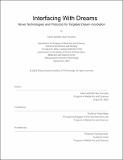Interfacing with Dreams : Novel Technologies and Protocols for Targeted Dream Incubation
Author(s)
Haar Horowitz, Adam Jedidiah
DownloadThesis PDF (60.60Mb)
Advisor
Maes, Pattie
Terms of use
Metadata
Show full item recordAbstract
Scientific research into relationships between sleep physiology and waking cognition has progressed dramatically in the past few decades, but research on the basic science, function, and health consequences of dream phenomenology has not. This dissertation describes research into novel devices and protocols for improving dreamer control of dreams: their content and related function. Set within historical and cultural contexts for the import of dreaming, this thesis seeks to reorient science and everyday health practices toward a renewed respect for the contributions of the dreaming mind to overall wellbeing and cognition.
This thesis research emphasizes the use of a scientifically reliable dream incubation protocol (Targeted Dream Incubation: TDI) to influence dream content across multiple sleep stages, as well as reviewing historical context of dream science and cultural practices. Along with a wonderful team, I have developed a wearable electronic system (Dormio) and associated protocol (TDI) that cause experimental subjects to dream specifically and reliably of a chosen theme, using stimuli presented in pre-sleep wake and N1 sleep in combination with serial awakenings. The experimental work of this thesis centers on four experiments utilizing TDI. Our first experiment demonstrates that TDI does, indeed, induce cue-related N1 dreaming and can be used to augment creativity across a range of tasks related to incubated dream themes. Still further analysis shows that our TDI protocol can be used to augment creative self-efficacy, the belief that one has the ability to produce creative outcomes. Our second experiment shows that TDI can be used to influence daydreams as well as night dreams, and enables controlled comparisons of these brainstates. This experiment employs and validates a non-contact version of TDI, in which dream incubation is effective simply via timed audio cues on a Dormio web interface without any wearable sleep staging device. Pushing beyond bench science to clinical practice, a third experiment in collaboration with PTSD-focused psychiatrists examines the capacity for TDI to influence subjects’ levels of self-efficacy regarding nightmares and dreaming (the belief one can control one’s dream content, a key predictor of successful nightmare therapies). We show TDI can significantly increase self-efficacy, reducing feelings of helplessness and nightmare related complaints. Finally, a fourth pilot experiment extends our dream incubation protocols into the REM state, opening up avenues for influencing novel mnemonic and affective REM dream-related functions.
The results demonstrate the potential bench science and clinical relevance of our suite of dream incubation protocols and technologies. We identify new opportunities for interfacing with human cycles of memory, mind-wandering, emotional adaptation and creative cognition across the full 24 hour spectrum of thought. Our dream incubation system has spawned a series of experiments, both scientific and artistic, and been an impetus for the first conference and first collection of scientific papers on the new field of Dream Engineering. Beyond describing the creation and validation of dream incubation tools, this thesis explores applications and implications of incubating dreams, maps out methods of community building that could bring pluralistic perspectives into dream research, and extends our published writings on the ethics of this research in order to outline an appropriate future for this emerging field.
Date issued
2022-09Department
Program in Media Arts and Sciences (Massachusetts Institute of Technology)Publisher
Massachusetts Institute of Technology